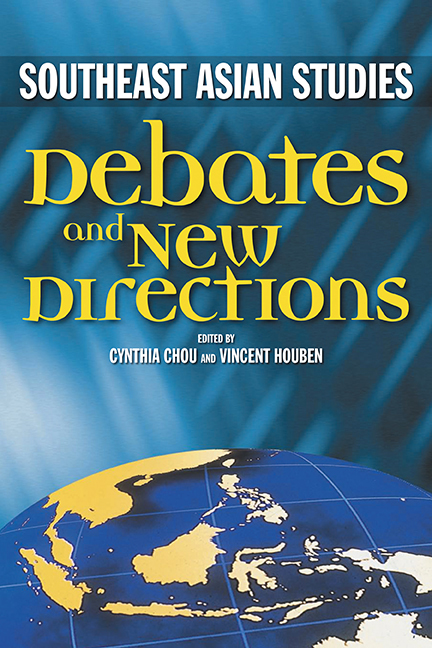Book contents
- Frontmatter
- Contents
- List of Contributors
- Preface
- 1 Introduction
- 2 Southeast Asia: Personal Reflections on a Region
- 3 Region, Academic Dynamics, and Promise of Comparitivism: Beyond Studying ‘Southeast Asia’?
- 4 Towards Multi-Laterality in Southeast Asian Studies: Perspectives from Japan
- 5 The Academic's New Clothes: The Cult of Theory versus the Cultivation of Language in Southeast Asian Studies
- 6 Rethinking Southeast Asian Politics
- 7 Reconceptualizing Southeast Asian Studies
- 8 Southeast Asian History: The Search for New Perspectives
- 9 Film, Literature, and Context in Southeast Asia: P. Ramlee, Malay Cinema, and History
- Bibliography
- Index
8 - Southeast Asian History: The Search for New Perspectives
Published online by Cambridge University Press: 21 October 2015
- Frontmatter
- Contents
- List of Contributors
- Preface
- 1 Introduction
- 2 Southeast Asia: Personal Reflections on a Region
- 3 Region, Academic Dynamics, and Promise of Comparitivism: Beyond Studying ‘Southeast Asia’?
- 4 Towards Multi-Laterality in Southeast Asian Studies: Perspectives from Japan
- 5 The Academic's New Clothes: The Cult of Theory versus the Cultivation of Language in Southeast Asian Studies
- 6 Rethinking Southeast Asian Politics
- 7 Reconceptualizing Southeast Asian Studies
- 8 Southeast Asian History: The Search for New Perspectives
- 9 Film, Literature, and Context in Southeast Asia: P. Ramlee, Malay Cinema, and History
- Bibliography
- Index
Summary
INTRODUCTION
History, the study of human development in the course of the past, constitutes one of the cornerstones of Southeast Asian studies. Despite different opinions on the usefulness of historical knowledge about this world region, researchers agree that an understanding of history is vital to be able to assess Southeast Asia in its present form. In seeking new dimensions for regional studies, history as a field of enquiry has therefore to be accounted for, taking into consideration that not only within Southeast Asian studies, but also within the discipline of history, important theoretical and methodological developments have taken place that have repositioned the role of the “regional” within the “historical”.
Over the past fifty years, the number and quality of history books on Southeast Asia have increased steadily. After World War II basic political studies were produced that tried to explain the rise of the newly independent Southeast Asian states. The main thematic focus then shifted towards economic and societal issues, looking at long-term processes that explain why most of the Southeast Asian nations were still under-developed and characterized by great societal disparities. With the onset of the linguistic and cultural turns in the social sciences, historians of the region have increasingly turned to the study of the formation of identities in different time settings, embarking on the diachronic analysis of mentalities, representations and discourses of local knowledge.
Not only have themes shifted, the time horizon in Southeast Asian historical research has shifted as well. Whereas in the 1950s and 1960s contemporary histories took precedence over studies of older periods, this imbalance has since been redressed, with a renewed interest in pre-colonial and colonial topics, but now perceived from an Asia-centric perspective putting Southeast Asian dynamics up front instead of changes emanating from the West. On the one hand, longitudinal studies, covering long time- spans of several hundred years have emerged; on the other hand, interest in periods of transition that cross-cut traditional periodizations marked by political turning-points has increased.
- Type
- Chapter
- Information
- Southeast Asian StudiesDebates and New Directions, pp. 140 - 161Publisher: ISEAS–Yusof Ishak InstitutePrint publication year: 2006



